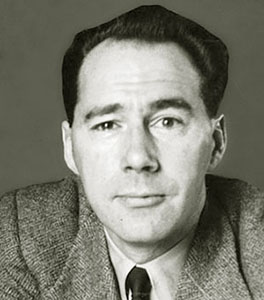
Self-explanatory I hope. This will be a regular section in which I will look at the work and career of great (and perhaps not so great) authors in the field both of science fiction and fantasy. Maybe even horror.
 John Wyndham (1903-1969)
John Wyndham (1903-1969)
Some of the first science-fiction I read - and some of the best - came from the pen and the mind of one John Wyndham Parkes Lucas Beynon Harris, or John Wyndham, the name under which he usually (though not always) wrote. You’ll be familiar with two of his most famous works, 1951’s
The Day of the Triffids, and 1957’s
The Midwich Cuckoos, probably best known to the world as
Village of the Damned. Born in Warwickshire in England’s West Midlands (the same county where another, little-known writer called Shakespeare first mewled his cries to the world) Wyndham was subjected to not only the traumatic and stigmatic separation of his parents in 1911, a time when such things just “did not happen” in strait-laced England, but also to his father’s then ultimately unsuccessful attempts to sue for the custody of his wife and family. Not quite sure what old Mr. Harris was thinking there, but he lost the case amid much embarrassment, necessitating his ex-wife’s move away from Birmingham with her children.
Having tried several paths to a career John settled on writing in 1927, and, presumably because it was the popular genre of the time, began writing detective stories, but he switched to science-fiction in 1931, his first story “Worlds to Barter” seeing publication under the name John B. Harris, soon changed to John Beynon Harris and then John Beynon (the Parkes part of his name was quickly jettisoned, possibly due to his animosity towards his father). At the end of the 1930s he met his future wife Grace, though as she worked as a teacher and the
Marriage bar then in force would have meant that she would have had to give up her job, they did not marry until 1963.
When World War II began, Wyndham worked both as a cipher operator and in the Home Guard, and later took part in the Normandy Landings on D-Day. Much of what he saw during the war informed his later writing, which betrays a dark, bleak, despairing view of man and his future. His first novel after the war, published under the name he would use to the end of his life, John Wyndham, was his most successful and set him on a career path that led to him being later described as a “true English visionary”.
The Day of the Triffids, published in 1951, concerns the arrival on Earth of alien plants, after almost all of the population has been blinded by weaponised dust dropped the night before their arrival. Like the Red Weed in Wells’s
The War of the Worlds, the Triffids become the dominant plant form, and threaten to challenge even man’s place at the top of the tree. The novel was later filmed as a Hollywood movie and given a terrible pasted-on ending that completely ruins the dark, apocalyptic non-ending of the novel, while as mentioned earlier,
The Midwich Cuckoos, published in 1953, was also turned into a movie and renamed
Village of the Damned.
Wyndham somewhat set the bar for English science fiction writers, and is fondly remembered. Though In his life he wrote only seven novels, with two others published posthumously, he also wrote a lot of short stories, some of which were collected together in anthologies after his death. With Wyndham, however, it was definitely a case of quality over quantity. He died at the age of 65, having been married to the same woman all his life.
Novels
(Note: Although Wyndham did write crime fiction, I’m not interested in that and have therefore only included here his science fiction works. Anything published after his passing is indicated in bold).
As John Beynon:
The Secret People (1935)
Planet Plane/Stowaway to Mars (1936)
As John Wyndham
The Day of the Triffids (1951)
The Kraken Wakes (1953)
The Chrysalids (1955)
The Midwich Cuckoos (1957)
The Outward Urge (1959)
Trouble with Lichen (1960)
Chocky (1968)
Web (1979)
Plan for Chaos (2009)
Short Story Collections
Jizzle (1954) (Is it hilarious that I had to get round the expletive block for that one?)
 The Seeds of Time (1956)
The Seeds of Time (1956)
Tales of Gooseflesh and Laughter (1956)
Consider Her Ways and Others (1961)
The Infinite Moment (1961)
Sleepers of Mars (1973)
The Best of John Wyndham (1973)
Wanderers of Time (1973)
Exiles on Asperus (1979)
No Place Like Earth (2003)








 Hybrid Mode
Hybrid Mode